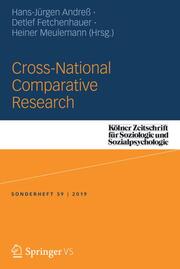Detailansicht
Cross-national Comparative Research
Kölner Zeitschrift für Soziologie und Sozialpsychologie Sonderhefte 59
ISBN/EAN: 9783658256098
Umbreit-Nr.: 6758240
Sprache:
Englisch
Umfang: vi, 571 S., 8 s/w Illustr., 571 p. 8 illus.
Format in cm:
Einband:
kartoniertes Buch
Erschienen am 15.07.2019
Auflage: 1/2020
- Zusatztext
- Cross-National Comparative Research is concerned with observing social phenomena across countries, and with developing explanations for their similarities and differences. This Special Issue focuses on the use of Cross-National Comparative Research to study the effects of national and sub-national contexts on behaviors and attitudes of individual actors. Moreover, it is of interest how behaviors and attitudes at the individual level lead to national and sub-national outcomes at the meso and macro levels. How do immigration policies affect migrants' well-being? Does the number of divorcees in a country influence individual divorce risks? Are human values universal, or do they vary from one country to another? Under which conditions is political protest triggered, and when does it lead to revolutionary changes within society? These and other questions are typical of cross-national comparative analyses that seek to ascertain how upper-level (macro, meso) contexts influence micro-level phenomena, and how outcomes at the individual level are once more reflected at the meso and macro levels.
- Kurztext
- Cross-National Comparative Research is concerned with observing social phenomena across countries, and with developing explanations for their similarities and differences. This Special Issue focuses on the use of Cross-National Comparative Research to study the effects of national and sub-national contexts on behaviors and attitudes of individual actors. Moreover, it is of interest how behaviors and attitudes at the individual level lead to national and sub-national outcomes at the meso and macro levels. How do immigration policies affect migrants' well-being? Does the number of divorcees in a country influence individual divorce risks? Are human values universal, or do they vary from one country to another? Under which conditions is political protest triggered, and when does it lead to revolutionary changes within society? These and other questions are typical of cross-national comparative analyses that seek to ascertain how upper-level (macro, meso) contexts influence micro-level phenomena, and how outcomes at the individual level are once more reflected at the meso and macro levels. Prof. Dr. Hans-Jürgen Andreß, Prof. Dr. Detlef Fetchenhauer and Prof. Dr. Heiner Meulemann teach sociology and social psychology at the University in Cologne, Germany.
- Autorenportrait
- Prof. Dr. Hans-Jürgen Andreß, Prof. Dr. Detlef Fetchenhauer and Prof. Dr. Heiner Meulemann teach sociology and social psychology at the University in Cologne, Germany.
